★★½
“Still a better movie than Wonder Woman 1984.“
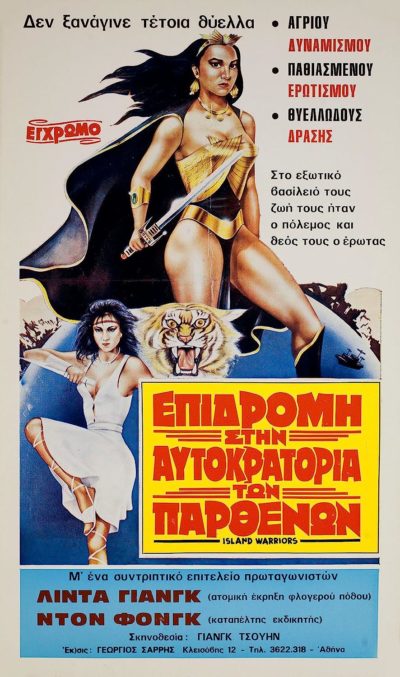 This Taiwanese production takes place on an island where women have been separate from men for 23 generations, developing more or less your stereotypical Amazonian society. Men are rejected, male babies tossed out to see to sink or swim (typically the former) and they have build a giant, albeit largely unconvincing, statue of their founding ruler, which fires cannonballs out of its eyes. This is not inappropriate, since the current occupant of the throne, Queen Nadanwa (Yeung). has a harsh line in anti-male rhetoric (“All men are dangerous!”), accompanied by castration. Her subjects dress either in flimsy white robes or shiny battle armour, and engage in gymnastic or circus-related forms of entertainment.
This Taiwanese production takes place on an island where women have been separate from men for 23 generations, developing more or less your stereotypical Amazonian society. Men are rejected, male babies tossed out to see to sink or swim (typically the former) and they have build a giant, albeit largely unconvincing, statue of their founding ruler, which fires cannonballs out of its eyes. This is not inappropriate, since the current occupant of the throne, Queen Nadanwa (Yeung). has a harsh line in anti-male rhetoric (“All men are dangerous!”), accompanied by castration. Her subjects dress either in flimsy white robes or shiny battle armour, and engage in gymnastic or circus-related forms of entertainment.
Nadanwa’s antipathy initially seems not wrong, as the island is raided by rapist pirates, who are barely fought off by the women. However, it turns out there is another island nearby, occupied only by men – the survivors of the sea-dispatched male babies mentioned above. They’re more chill, and just want to get back to both sexes living in harmony. The ruler’s sister Chung Ah (Fong) has been having a secret affair with their leader, Lu (Wong). Needless to say, queenie is not going to be happy about this. However, she does eventually realize that some men might just have their uses, such as increasing the power of her eyeball cannons, in order to defend her realm from the pirates.
You may be thinking this could perhaps go through male rape for comedic purposes, a hunt for treasure, light lesbian canoodling and end in a mass battle between the Amazons and the buccaneers, with the island of men coming in to save the day. This will, in all likelihood, be accompanied by an upbeat and poppy soundtrack, which could not possibly be more eighties if it was sporting AquaNet and leg-warmers. Well, I’m not going to spoil it for you. Nadanwa also keeps a tiger as a pet, which fits with her general philosophy, I guess. Though it must be said, these Amazons do seem weirdly incompetent, needing male help not just in the armaments category, but when giving birth. You’d think they might have figured out the basics after 23 generations.
There are some reasonable moments of scale here, though things like the battles against the pirates are more notable for the number of participants than their combat ability. The problem is mostly one of tone, and it’s hardly alone there, in Taiwanese productions from this decade. A lot of the attempts at comedy have not aged well, if they were ever funny to begin with. In a movie which also includes wholesale child genocide, sexual assault of both genders, and genital mutilation, you’re not exactly looking for light relief. Although Yeung is her usual reliable self as a leader, this falls short of the likes of Golden Queens Commando., and only just scrapes over the bar set at a height of “acceptable entertainment.”
Dir: Yang-Ming Tsai
Star: Fong-fong Fong, Don Wong, Elsa Yeung
a.k.a. Island Warriors






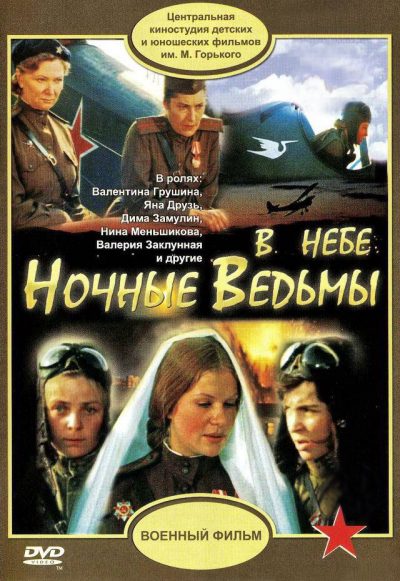
 After her brother drowns while high on drugs, Mary Ann “Lovely” Lovitt (Dooling) goes undercover at his school, Pacific Coast High, in order to root out the dealers responsible for his death. She discovers that the problem is far larger than is admitted, with those involved, and includes not just some of the most revered pupils e.g. star players on the football team (and, on more than one occasion, their jealous girlfriends!). A number of adults are also culpable, including leading school boosters, all the way up to leading local businessman ‘Honest Charley’ Gilmarten (Herd). Fortunately, Mary Ann is an expert in martial-arts, so proves more than capable of defending herself when attempts are made to dissuade her from investigating further.
After her brother drowns while high on drugs, Mary Ann “Lovely” Lovitt (Dooling) goes undercover at his school, Pacific Coast High, in order to root out the dealers responsible for his death. She discovers that the problem is far larger than is admitted, with those involved, and includes not just some of the most revered pupils e.g. star players on the football team (and, on more than one occasion, their jealous girlfriends!). A number of adults are also culpable, including leading school boosters, all the way up to leading local businessman ‘Honest Charley’ Gilmarten (Herd). Fortunately, Mary Ann is an expert in martial-arts, so proves more than capable of defending herself when attempts are made to dissuade her from investigating further.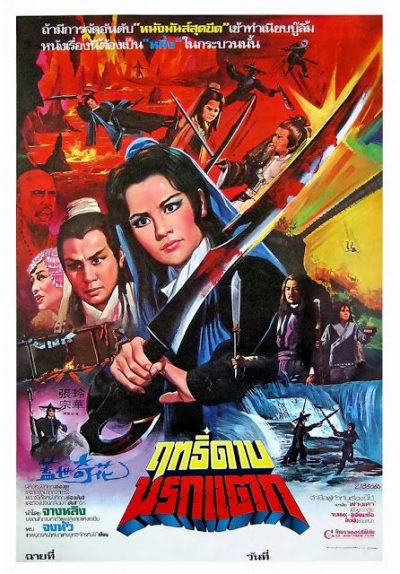 Another solid Pearl Chang movie – despite being mis-labelled as Wolf Devil Woman 3, it is in now way related to
Another solid Pearl Chang movie – despite being mis-labelled as Wolf Devil Woman 3, it is in now way related to  That’s the voice-over with which this starts, segueing into a bit of nude interpretive dance – well, semi-nude, the guy keeps his Y-fronts on, for which I am grateful – that has absolutely no relation to the rest of the film. At its core, this is a battle of triad versus triad: one overseen by Lau, the other by Fung. The former is assassinated, and his daughter, Angel (Yeung) takes over – she’s also keen to track down the perpetrators, with the most obvious beneficiary being Fung. But not so sure is Fung’s right-hand man, Jimmy Lee (Lee), who was there for the killing, and helps Angel’s investigation.
That’s the voice-over with which this starts, segueing into a bit of nude interpretive dance – well, semi-nude, the guy keeps his Y-fronts on, for which I am grateful – that has absolutely no relation to the rest of the film. At its core, this is a battle of triad versus triad: one overseen by Lau, the other by Fung. The former is assassinated, and his daughter, Angel (Yeung) takes over – she’s also keen to track down the perpetrators, with the most obvious beneficiary being Fung. But not so sure is Fung’s right-hand man, Jimmy Lee (Lee), who was there for the killing, and helps Angel’s investigation.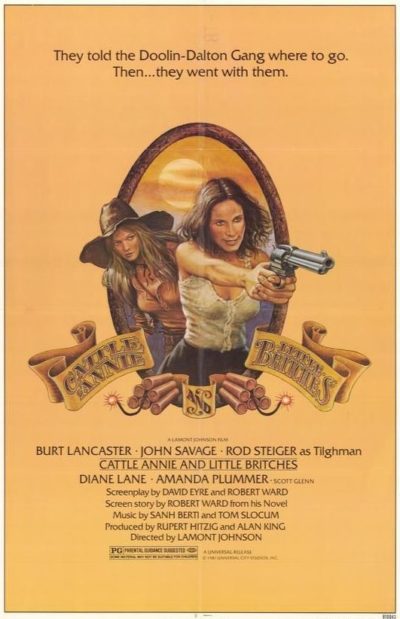 For example, rather than being born and brought up in Oklahoma, the duo are portrayed as making their way out to California to seek their fortune, when they’re forcibly detoured to Guthrie, OK, There, they encounter Bill Doolin (Lancaster) when he and his gang visit the town. Annie falls for gang member Bittercreek Newcomb (John Savage) and they end up being taken by him to the gang’s hideout. Their knowledge of the Doolin Gang is entirely based on the embellished stories they’ve heard about them, and they’re disappointing to find reality comes up short.
For example, rather than being born and brought up in Oklahoma, the duo are portrayed as making their way out to California to seek their fortune, when they’re forcibly detoured to Guthrie, OK, There, they encounter Bill Doolin (Lancaster) when he and his gang visit the town. Annie falls for gang member Bittercreek Newcomb (John Savage) and they end up being taken by him to the gang’s hideout. Their knowledge of the Doolin Gang is entirely based on the embellished stories they’ve heard about them, and they’re disappointing to find reality comes up short.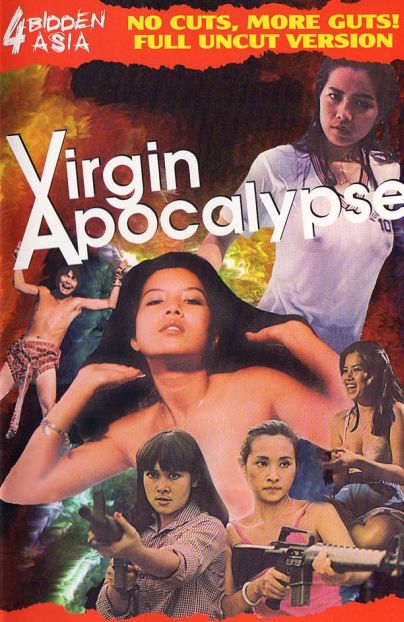

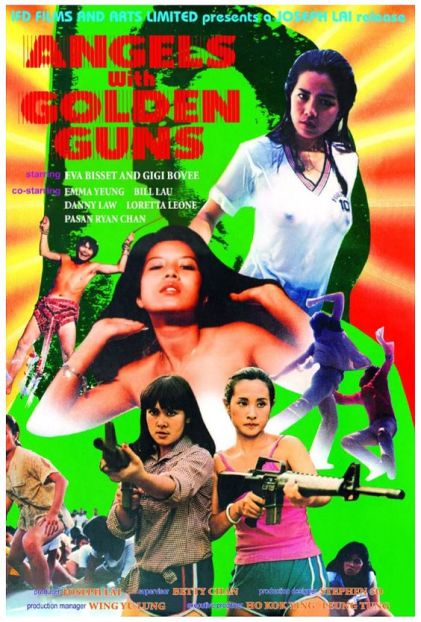
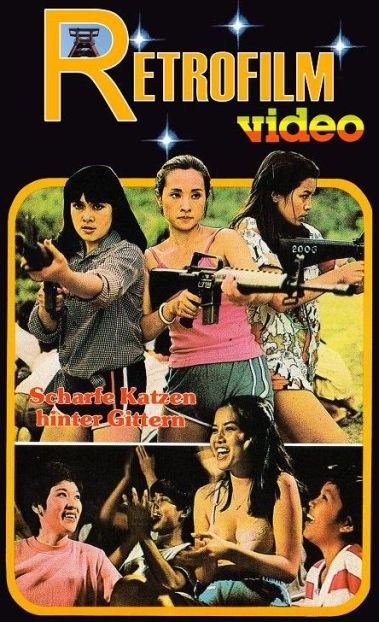
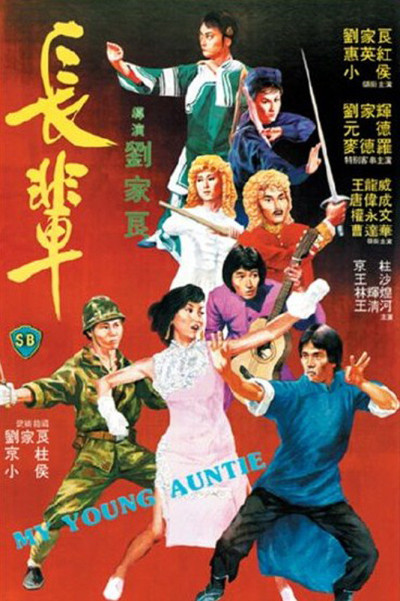
 Tian Si Si (Yim) is a spoiled rich girl, whose doting daddy pays kung fu fighters to give the illusion that she can beat them up. Despite his desire to wed her off in an arranged marriage to Yang Fan (Tak), Si Si runs off to meet her idol, Qing Ge (Chen), a true master of the martial arts, whom she knows only through the fictional tales of derring-do, told by her maid. Susequently, Si Si becomes the target first of con-men, then is sold to a brother, and when they realize who she is, becomes the centre of a scheme to force her into marriage, so her husband can inherit her father’s fortune. Throughout it all, Yang is about the only loyal friend, though when she meets her idol, she discovers that, while if he isn’t as depicted, he still has a courageous streak of his own.
Tian Si Si (Yim) is a spoiled rich girl, whose doting daddy pays kung fu fighters to give the illusion that she can beat them up. Despite his desire to wed her off in an arranged marriage to Yang Fan (Tak), Si Si runs off to meet her idol, Qing Ge (Chen), a true master of the martial arts, whom she knows only through the fictional tales of derring-do, told by her maid. Susequently, Si Si becomes the target first of con-men, then is sold to a brother, and when they realize who she is, becomes the centre of a scheme to force her into marriage, so her husband can inherit her father’s fortune. Throughout it all, Yang is about the only loyal friend, though when she meets her idol, she discovers that, while if he isn’t as depicted, he still has a courageous streak of his own.